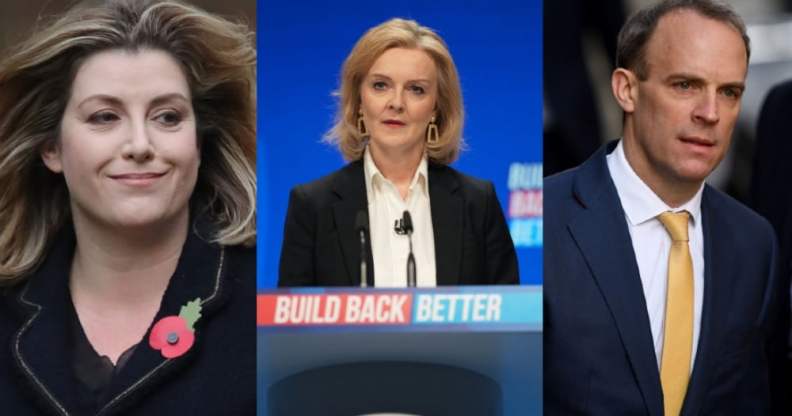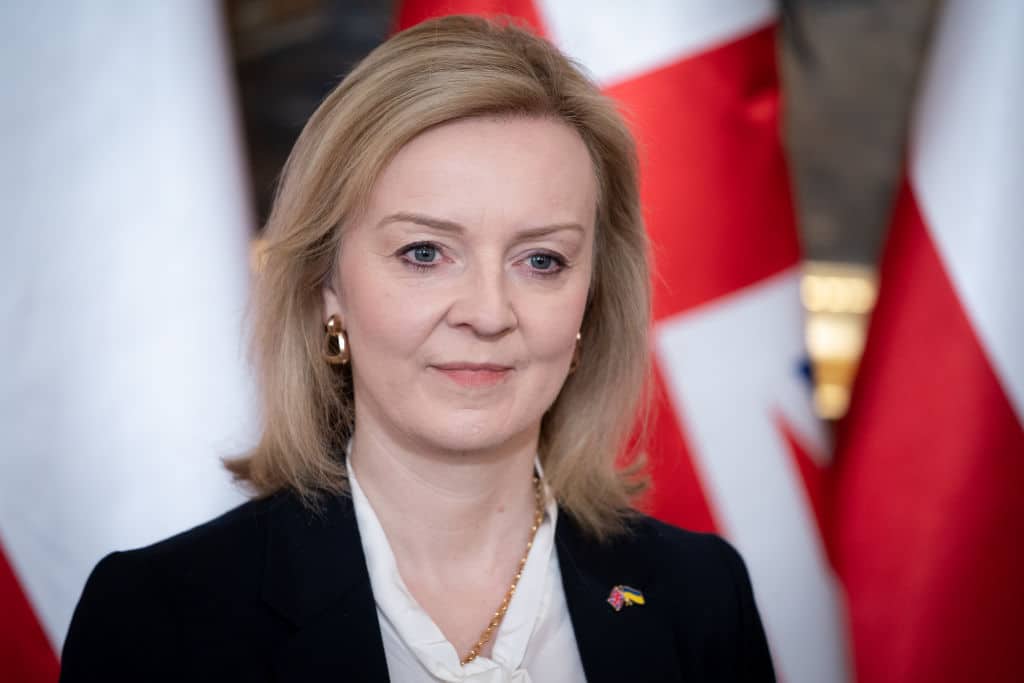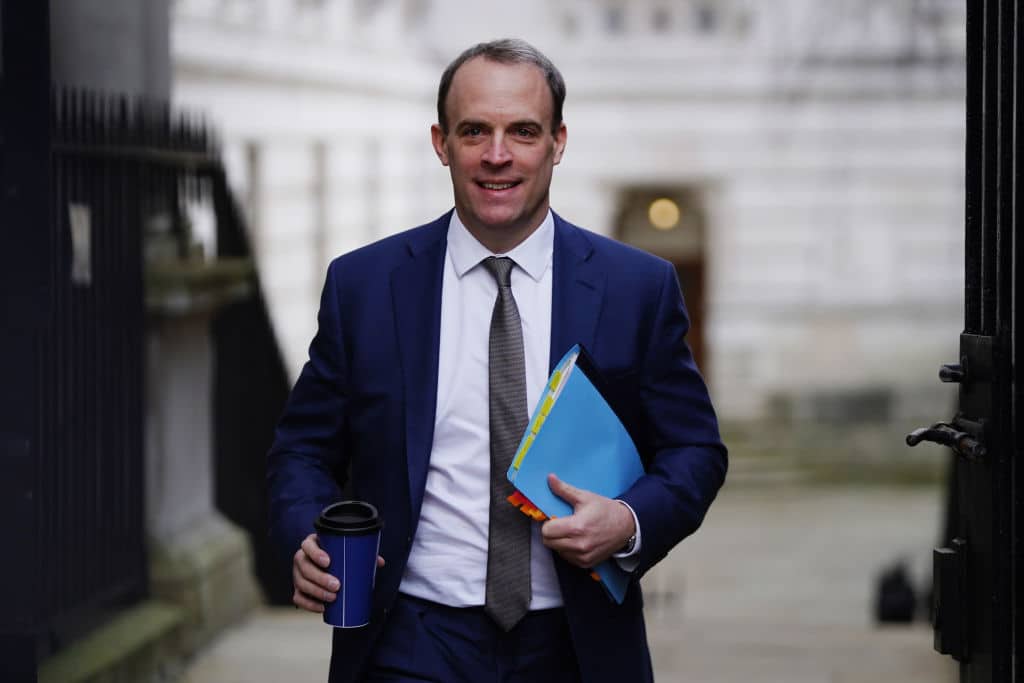How the next prime minister could change the course of LGBTQ+ rights – for better or worse

Dominic Raab, Liz Truss and Penny Mordaunt have been tipped as potential successors to Boris Johnson. (Getty)
Boris Johnson has reportedly agreed to step down as Tory leader, meaning the race for the next prime minister is on – and the future of LGBTQ+ rights hangs in the balance.
Johnson will announce his resignation Thursday morning (7 July), the BBC has reported, after 36 hours of crisis sparked by an unprecedented tranche of ministerial resignations.
He hopes to stay on until the autumn as caretake prime minister, according to the BBC, while the Tories launch a leadership contest.
There is a long list of Tories eager to take his place. Some of the frontrunners who have been tipped as a potential next Tory leader include Liz Truss, Dominic Raab, Jeremy Hunt, Ben Wallace and Penny Mordaunt.
Attorney general Suella Braverman was the first to come out and say she will run, in an interview with Robert Peston on Wednesday night (6 July).
Sajid Javid and Rishi Sunak, whose resignations sparked Johnson’s downfall, are also expected to throw their hats in the ring.
But there are fears among party members that the likely frontrunners are all too happy to “appease” right-wing voters by speaking against LGBTQ+ and trans rights.
Liz Truss has used LGBTQ+ rights to ‘rile up her right-wing support base’
For some time, Liz Truss has been tipped as a natural successor to Johnson – something that LGBTQ+ activists have repeatedly expressed concern over.
As minister for women and equalities, Truss scrapped much-needed reform to the Gender Recognition Act (GRA) despite reams of evidence showing there was strong public support for changes that would make accessing legal gender recognition easier for the trans community.
She has also been criticised for her appointments to the Equalities and Human Rights Commission, and her defences of “gender critical” views.
A Conservative Party member, who asked not to be named, told PinkNews in April that Truss has used the LGBTQ+ community during her time as equalities minister “to rile up her right-wing support base”.

Liz Truss meets Polish Prime Minister at Chancellery in Warsaw, Poland, on April 5, 2022. (Mateusz Wlodarczyk/NurPhoto via Getty)
“She’s shown a lack of real knowledge or care for the community and it feels very much like she has used the role to only push forward women’s rights, not including trans women within that,” they said.
“We need a leader who isn’t going to use LGBTQ+ issues as a fun thing to throw out in the chamber, but who cares about getting down to the nitty gritty of the issues and will go out into the community and learn from trans people who are calling for GRA reforms – who will listen to victims of conversion therapy and ensure they protect them in legislation.”
Truss has done nothing to curry favour with the UK’s LGBTQ+ community since she became equalities minister, but that doesn’t mean she’s always been opposed to LGBTQ+ rights. In fact, TheyWorkForYou.com, a website that tracks the voting patterns of elected representatives, shows that Truss has generally voted in favour of rights for lesbian, gay and bisexual people.
In May, Downing Street announced it was scrapping plans to ban conversion therapy for trans people – an issue Truss’ office had led on. It later emerged that Truss hadn’t even been made aware of Johnson’s much-criticised decision before it was announced, and she is understood to be against the U-turn.
The same party member told PinkNews that they are broadly worried that the next Tory leader could push a conversion therapy ban off the table once more.
“I worry that a change of leader would lose momentum in the fight and will give the new candidate the opportunity to push it back and use the standard, ‘I need time to understand the legislation, I have other priorities since taking over’ [excuse].
“We’ve heard it all before and we’re at a point now where if the party wants to keep any credibility or LGBTQ+ members, conversion therapy needs to be banned in legislation with trans people included.”
Dominic Raab, Suella Braverman and Sajid Javid have spoken out against trans rights
Dominic Raab is another senior minister tipped as a potential next Tory leader – although he’s also not an ideal prospect for the UK’s LGBTQ+ community.
The deputy prime minister has spoken out against much-needed reforms to the Gender Recognition Act (GRA) that would make it easier for trans people to have their gender legally recognised. Speaking in 2019, he said he wanted a society that was “tolerant and warm” to LGBTQ+ people, but said the UK had to be “very careful” when it came to young trans people.
Much like Truss, Raab has generally voted in favour of advancing gay, lesbian and bisexual rights. He was one of many Tory MPs who voted in favour of same-sex marriage in 2013.
However, since then, Raab has done little to win the support of LGBTQ+ Tories. One party member said he “hasn’t been active” in the fight for LGBTQ+ rights and that he’s likely trying to “appease” his right-wing support base by speaking out against trans rights.

Dominic Raab. (Peter Summers/Getty)
Those same trends are borne out among other likely leadership contenders. Sajid Javid, who resigned as health minister on Tuesday (5 July), has spoken out repeatedly against trans rights – most recently, he linked being trans to child sex abuse.
In September 2021, he said it was “scientific fact” that only women have cervixes. Like many of his fellow Tories, he voted in favour of same-sex marriage in 2013.
Another possible contender is Jeremy Hunt, who finished in second place in 2019’s leadership contest behind Johnson.
The same Conservative Party member told PinkNews that Hunt has “genuinely been on a journey of understanding” when it comes to LGBTQ+ issues. He won some praise in 2019 when he spoke out in favour of LGBTQ+ inclusive education for children and he has voted in favour of advancing LGBTQ+ rights.
Attorney general Suella Braverman threw her hat in the ring Wednesday. On Sunday (3 July), she launched an attack on trans rights reforms, saying that a “rights culture” has “spun out of control” in the UK, and that a “collective frenzy” over trans rights means that the the “basics of biology” have been “turned upside down”.
he even hit out at the 2010 Equality Act, which includes being trans as a characteristic protected from discrimination, claiming it was “posing a lot of practical problems for authorities, schools, sporting bodies, prisons and the NHS”.
Ben Wallace is the only prominent Tory whose name has been floated as a possible successor to Boris Johnson who voted against same-sex marriage. He also opposed the Equality Act.
Penny Mordaunt could be a dark horse in a leadership battle
A potential dark horse in the Tory leadership race is Penny Mordaunt, who served as minister for women and equalities in Theresa May’s government between 2018 and 2019. Mordaunt has made a name for herself as one of the most progressive Tories when it comes to LGBTQ+ rights.
During her tenure as equalities minister, Mordaunt oversaw a public consultation on reforming the Gender Recognition Act (GRA). Liz Truss, her successor, later announced that she was scrapping plans to streamline the process and make it easier for trans people to be legally recognised in their correct gender.
Her leadership would build a better and more inclusive Britain.
Jayne Ozanne, an LGBTQ+ rights activist who previously sat on the government’s LGBT Advisory Panel, told PinkNews in April that Mordaunt is “the only person” who can successfully rebuild the party’s relations with the LGBTQ+ community as the next Tory leader.
“She has shown herself to be fully committed to the LGBTQ+ community and has consistently delivered on her promises,” Ozanne said.
“She is a woman of deep integrity and principle, who has won the trust and respect of MPs right across the house. Like many, I was surprised she was not given a more prominent role in this administration, although that could of course be because she was perceived as a threat.
“Her leadership would without doubt bring the party back to the middle ground and, I am convinced, build a better and more inclusive Britain.”
Of course, it’s not yet clear which Tories will put their names forward to become the next party leader, and the next prime minister.
Those who have remained in his cabinet until the end – namely, Liz Truss and Dominic Raab – might find that their names are tainted, while others have been bruised by Partygate and various other scandals.
In the final days of his premiership, Johnson made trans rights an increasing part of his “culture war” ploy. It may be that the next leader decides to continue down this road, or it may be that the Tories decide a complete change in tack is necessary.

